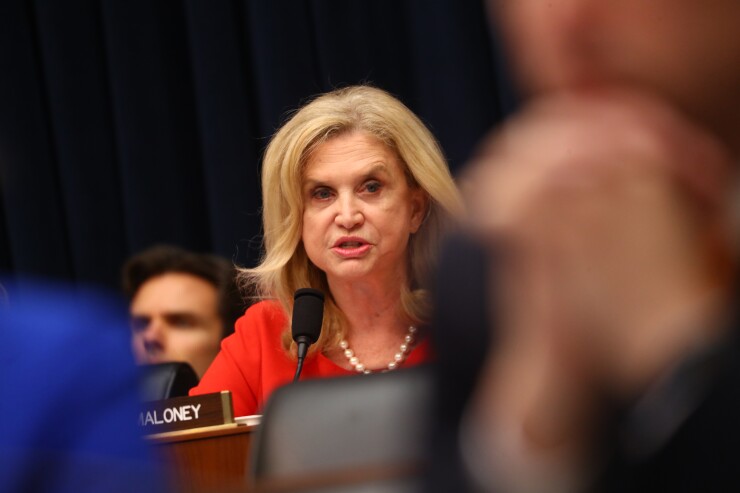WASHINGTON — Lawmakers on the House Financial Services Committee clashed mightily on Wednesday afternoon over a bill that would introduce new limits and regulations over bank overdraft programs.
Convening for a markup hearing Wednesday, Rep. Carolyn Maloney of New York introduced the
“The bill before us,” said Maloney during the hearing, “cuts back on
Democrats have taken an increasingly sharp interest in banks’ overdraft practices, and in response some banks have made

It remains unclear if and when lawmakers in the Senate will take up Maloney’s bill. But earlier this month, key Democratic Sens. Elizabeth Warren of Massachusetts and Cory Booker of New Jersey
Retail bank advocates and some Republicans have
Rep. Blaine Luetkemeyer, a Missouri Republican and close ally to the community banking sector, railed against Maloney’s bill during the hearing, saying the reform would prevent smaller banks from offering a service that he described as cheaper and safer than payday lending.
If passed, the Overdraft Protection Act “will force many financial institutions — particularly small community institutions — to stop offering overdraft services altogether,” Luetkemeyer said. “I’m sure some of the members of the majority think that sounds great, but the reality would mean that consumers have even less resources and services at their disposal to cover unforeseen expenses.”
Later in the hearing, Maloney pushed back against Luetkemeyer’s claim that the bill would eliminate overdraft programs entirely. “That’s not true,” Maloney said. “This would require the consumer to make a choice and actively opt in. You can still opt in to overdraft fees, if you wish, but it cuts back on abusive, unfair policies. That’s what this bill does.”
Rep. Andy Barr, the Kentucky Republican, delivered an even more impassioned defense of existing overdraft policies when he attacked Maloney’s bill.
“Consumers,” Barr said, “know exactly what this product is, and they want it. There is a massive demand for it. This idea that this is a product that is worse or more usurious than payday loans is laughable.”
“If you want to push more people into unaffordable payday products, this bill is the way to do it,” Barr said.
Support for Maloney’s bill was echoed by two Democrats during Wednesday’s markup — Rep. Sylvia Garcia of Texas said that “quite frankly, people are sick and tired of some of these fees, and it's keeping some people from banking,” while Rep. Sean Casten of Illinois said that “for too long, banks have gotten away with charging excessive overdraft fees.”
Aside from overdraft reform, top lawmakers on the House Financial Services Committee also acknowledged bipartisan efforts to introduce federal regulations to the stablecoin sector. American Banker reported earlier this week that lawmakers had
Chair Maxine Waters of California, referring to the stablecoin bill, said that “we are unfortunately not there yet, and will therefore continue our negotiations over the August recess." She added that it was “critical that we continue moving the ball forward on this so we can have a regulatory framework and a protection framework while allowing responsible innovation."
The committee’s ranking member, Patrick McHenry, a North Carolina Republican, echoed Waters’s comments, saying “we're not there yet, but we're close.”
“There have been meaningful and quite productive conversations between us and our staffs,” McHenry said, “and these conversations will continue through the summer."
Sources told American Banker earlier this week that the draft legislation under negotiation was expected to introduce one-to-one dollar reserve requirements for issuers, a new licensing regime run by the Federal Reserve, and anti-money-laundering requirements for “payment stablecoins,” a type of cryptocurrency designed to maintain a steady value and be used in transactions rather than fluctuate as an investment.






